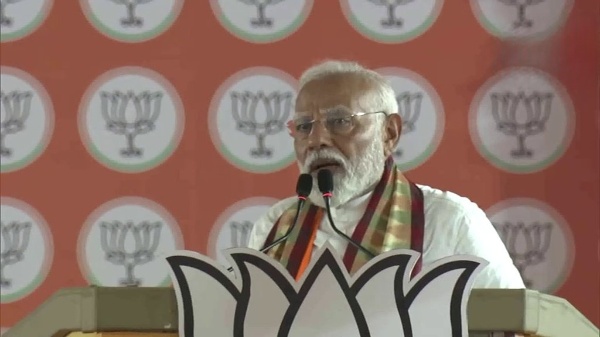In a fervent address to the public in Kendrapara, Odisha, Prime Minister Narendra Modi took aim at the contrasting narratives of governance between the Congress party and his own Bharatiya Janata Party (BJP). Modi’s speech underscored the historical context of India’s political landscape, juxtaposing the purported decades of scams under Congress rule with what he characterized as a decade marked by development during his tenure.
Addressing a diverse crowd gathered for the public meeting, Prime Minister Modi articulated, “The country has seen decades of the Congress rule as well a decade of the BJP rule. The decades under Congress rule saw nothing but big scams…and the last ten years under the Modi government were all about development.”
Modi’s remarks echoed a recurrent theme of BJP’s electoral campaigns, positioning itself as the party of progress and good governance, while portraying the Congress era as synonymous with corruption and inefficiency. By contrasting the alleged mismanagement of previous administrations with his government’s purported achievements, Modi sought to bolster his party’s image and rally public support ahead of forthcoming elections.
During his address, Modi outlined key initiatives undertaken by his government, ranging from infrastructure projects to social welfare schemes, emphasizing their impact on the nation’s development trajectory. The Prime Minister highlighted flagship programs such as ‘Make in India’, ‘Swachh Bharat Abhiyan’, and ‘Ayushman Bharat’, portraying them as transformative measures aimed at fostering economic growth and improving the quality of life for millions of Indians.
However, Modi’s assertions were not without critics, with opposition leaders and political commentators challenging the narrative of unbridled success propagated by the BJP. Critics point to issues such as economic slowdowns, agrarian distress, and allegations of authoritarian tendencies within the Modi administration as evidence of a more nuanced reality than the one presented in his speech.
Moreover, the Prime Minister’s remarks come at a time of heightened political polarization, with India grappling with various socio-economic challenges exacerbated by the COVID-19 pandemic. As the country navigates through a complex landscape of political rhetoric and policy debates, Modi’s assertions serve to intensify the ongoing discourse surrounding governance, accountability, and the future direction of the nation.
In conclusion, Prime Minister Narendra Modi’s address in Kendrapara, Odisha, encapsulated the contrasting narratives of governance espoused by the BJP and the Congress party. As the political landscape evolves, the battle for public perception and electoral dominance continues to shape India’s democratic fabric, with competing visions of progress and development at the forefront of the national discourse.
Prime Minister Modi’s rhetoric underscores the stakes involved in shaping India’s future trajectory, as citizens weigh competing narratives and evaluate the promises and pitfalls of political leadership. Whether Modi’s assertions resonate with the electorate remains to be seen, but his speech in Kendrapara undoubtedly adds fuel to the fiery debates surrounding India’s political landscape.



